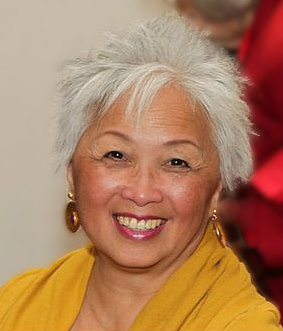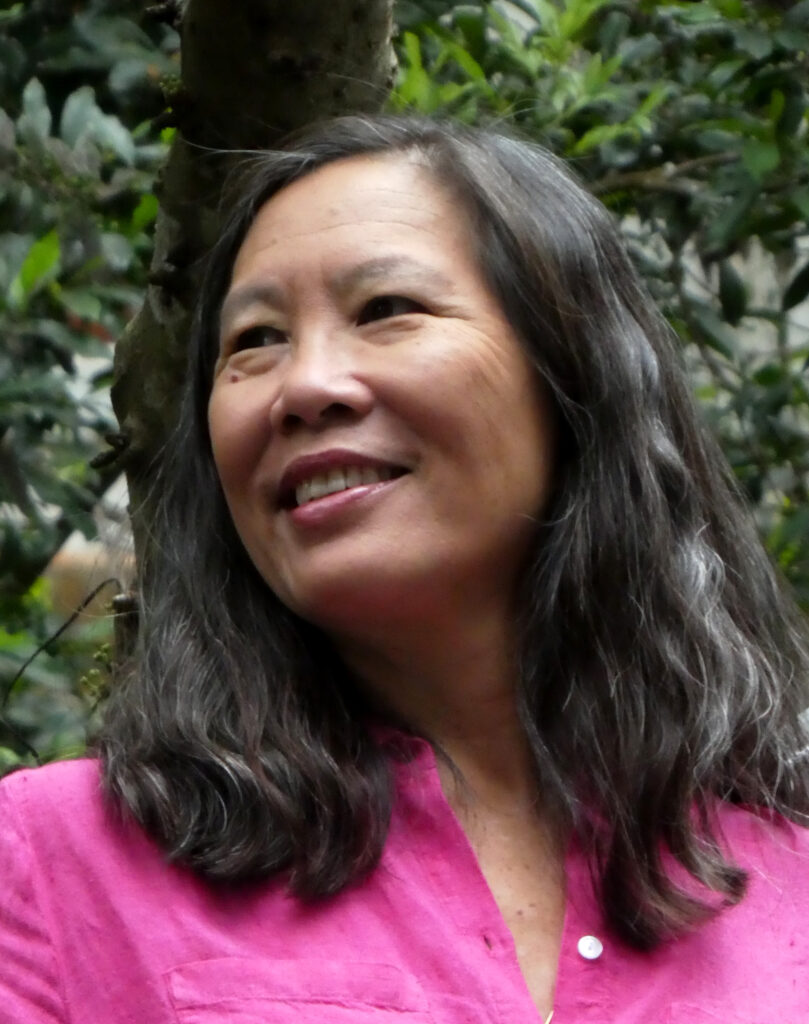On February 8, the US-China Education Trust (USCET) hosted a lively discussion featuring distinguished film trailblazers Shirley Sun, Felicia Lowe, and Robin Lung. The three shared their own experiences, and highlighted the larger issue of Asians making an imprint on the American film industry.
This was the seventh episode of USCET’s Asian Women Trailblazers Series, begun in 2021 as a response to rising anti-Asian hate, to highlight the contribution of Asians to the fabric of American society. In her opening remarks, Ambassador Julia Chang Bloch, executive chair of USCET, reminded the audience that, “in its 95-year history, only six Asians have earned acting Oscars…Historically, Hollywood offered Asians few opportunities in front or behind the cameras.” When they did, Asians were usually stereotypical and demeaning characters, she noted.
Moderator Shirley Sun then presented her own three-minute video tribute to both unsung and better-known Asian Americans in the film industry—from actors to videographers to lighting experts, including names like James Wong Howe, Anna May Wong, and Richard Chew. Sun’s montage, created for the program, features rare video and photographs. “It’s taken a century,” Sun pointed out, from the time of Anna May Wong’s silent film Toll of the Sea (1922) to Michelle Yeoh’s moment accepting the Best Actress Oscar at the Academy Awards in 2023.
Sun introduced her fellow filmmakers and panelists, Felicia Lowe and Robin Lung, and each began their remarks by showing a trailer for one of their documentaries. Up first, Felicia Lowe, an award-winning independent media producer, director, and writer, shared the story of finding her roots by uncovering her mother’s “secret” past. It took years for Lowe to finally understand why her mom answered “Say Hawaii” when people asked where she came from. In her film Chinese Couplets, Lowe traced her mother’s path, a story “that really represented the journey for a Chinese immigrant from that era.” Both her parents were held at Angel Island, where the US government detained, inspected, and examined roughly one million immigrants who primarily came from Asia.
Lowe discussed the impact of the Chinese Exclusion Act, which lasted from 1882 to 1943. That history “colored the perception of who we are as Chinese people,” Lowe explained. “I had two parents who came here during Exclusion. …There was such a fear that if any of that came out, we could all be deported back to China.”
Next, Sun introduced panelist Robin Lung, who specializes in bringing untold minority and women’s stories to film. A fourth-generation Chinese American with deep roots in Hawaii, Lung told how she spent seven years re-discovering the landmark documentary film Kukan (1941), about Chinese suffering and resistance to Japanese aggression during the early years of World War II. A Chinese American filmmaker named Li Ling-Ai was co-producer for KuKan, but only credited as a “technical advisor” in the film. KuKan won an Honorary Academy Award at the 14th Academy Awards in 1942, but the film then went missing for nearly 70 years. Lung’s documentary Finding Kukan (2017) brought Li Ling-Ai’s story, and her film, back to life. Lung also spoke of how Felicia Lowe reached out to help her with Finding KuKan. “We have this strong community of Asian American filmmakers who help each other out. Part of the trailblazing is to blaze a trail for somebody new, and Felicia did that for me,” said Lung.
Shirley Sun also presented the trailer for one of her own early films—A Great Wall (1986), the first movie to be co-produced between the United States and the People’s Republic of China. Sun recalled her fine memories of working with Chinese counterparts to produce this film. “The sense of Chinese identity is mainly culture, and that’s what we were trying to show. It’s more culture than ethnicity that defines Chineseness to most people,” said Sun. She was happy to discover that different ethnic groups in the United States all identified with the movie’s story, and that there are some universal elements when it comes to culture.
In their discussion, the panelists talked about the latest trends involving Asian Americans in the film industry, and agreed that Asian American films are now appreciated by a much broader American audience. This development is in part due to America’s 1965 Immigration and Nationality Act, which opened the door to more immigrants, bringing people from Asian countries who had experience with films. This also brought a new openness and mindset to the industry, enabling talented individuals and their children to access opportunities such as attending film schools and beyond.
“Now, we have people who are well equipped behind the camera and in front of the camera in every aspect of the industry. If you look at the list of Oscar nominations for 2024, three of the five short documentary producers are of Chinese descent. We are making an imprint and really seeing growth,” Lowe said. “At long last, the progression is now speeding up……We are finally seen as regular human beings. We are permitted to write different types of stories,” Sun agreed.
Watch the full discussion by clicking the video above!
See the document below for links to view the films previewed during the event
Panelists

Felicia Lowe is an award-winning independent media producer, director, and writer with 40 years of production experience. Her documentaries— Chinese Couplets, Carved in Silence, Chinatown, and China: Land of My Father reveal the unique experiences of Chinese in America while underscoring our common humanity. Her films have been broadcast on PBS and are used in classrooms across the country. Recent works include Pacific Gateway, a 360° virtual reality video on Angel Island Immigration Station and leading a creative team to produce 17 two-minute videos for the Gold Mountain: Chinese Californian Stories exhibit at the California Museum in Sacramento, California. Prior to producing documentaries, she was one of the first Asian female television news reporters and worked in children’s programming. A descendant of Angel Island detainees, she’s been a leader in the preservation and restoration of this National Historic Landmark.

Robin Lung is a fourth generation Chinese American with deep roots in Hawai‘i. She specializes in bringing untold minority and women’s stories to film. A Stanford University and Hunter College graduate, she became a filmmaker after successful careers in book publishing and higher education. Lung’s feature documentary Finding KUKAN tells the story of her discovery of the lost Oscar-winning film KUKAN and of Li Ling-Ai from Hawaiʻi who produced it. It received the American Library Association’s Notable Film Award in 2019 and was broadcast on PBS World’s America ReFramed series. Lung made her directorial debut with Washington Place: Hawai‘i’s First Home, a PBS documentary about the legacy of Hawaiʻi’s Queen Lili‘uokalani and her personal home. In 2015 Lung was selected as one of four documentary fellows for the NALIP ARC diverse female filmmaker residency, and she is a proud member of the renowned filmmaker distribution cooperative New Day Films. Lung’s short documentary Nancy Bannick: Saving Honolulu’s Chinatown, premiered at the 2022 Hawaiʻi International Film Festival and was chosen to screen on all transpacific Hawaiian Airline flights in 2023.
Moderator

Shirley Sun is a film director, producer, writer, art curator, and cultural interchange activist. Sun organized the first International Film Symposium in Beijing headed by eminent U.S. director, Martin Scorsese. Sun’s works draw on her East West bicultural heritage. She produced and co-wrote A Great Wall, (Director, Peter Wang), the first American feature co-production shot in the Peoples’ Republic of China. Sun directed and produced another feature, Iron and Silk, based on the true story of a young American who taught English in China, while pursuing martial arts, a hit at the Sundance Film Festival and on the Disney Channel. Sun’s documentaries include: The Cities of China series (co-produced with Sue Yung Li and Peter Wang), a cinematic breakthrough in filming Emperor Qin’s 2200-year-old tomb; Vinegar Joe, a portrait of the rugged Gen. Joseph Stilwell, the most powerful American in China during World War II; and SICHUAN, commissioned by National Geographic, a journey through China’s most populous and diverse province. Sun was Consultant on the movie The Last Emperor, directed by Bernardo Bertolucci (9 Academy Awards). Sun’s recent work, Fire and Ashes, which reveals behind-the-scenes creation of a new ballet RAkU, received acclaim at the San Francisco and New York dance film festivals. Sun served as Deputy Director of Public Programs at the National Endowment for the Humanities in Washington DC and Executive Director of the Chinese Culture Center in San Francisco. She holds a Ph.D. and M.A. in History of Asian Art, Stanford University.
If you agree about the importance of programs like these, please consider making a tax-deductible donation to the US-China Education Trust. Your generosity will support USCET’s work to create opportunities for exchanges between students and scholars in the US and China, and to keep US-China education exchanges strong.
